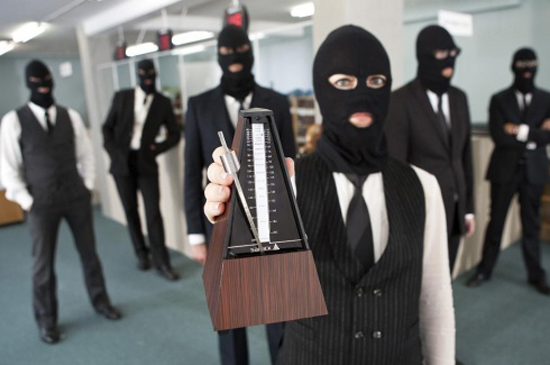Sound of Noise – Johannes Stjärne Nilsson, Ola Simnonsson
Critics’ week
Some of you might have stumbled across this Swedish duo on Youtube: Johannes Stjärne Nilsson & Ola Simonsson are the creators of an award-winning short film called Music for One Apartment and Six Drummers. With a penchant for weird sounds, a group of six activist drummers break into a house and jam using objects and utensils. Their directorial motto is that ‘sound and image are equal narrative devices’. Hence, in Sound of Noise, the feature-length sequel, the gang returns with a four-clause manifesto that will cause chaos to an unidentified city. Their ‘music-attacks’ become bigger in scale and production, and a new character is introduced: Amadeus, the policeman that detests music and wants to arrest this dangerous band! The humour in this film has an absolutely absurd, anarchist element that floods you with some kind of intoxicating freedom. Being ridiculously funny without any hidden meanings, the imaginative ways the band produces sounds (making STOMP seem monotonous), builds up in brilliance every time they perform a new musical notation. We are dealing here with symphonies with names like "Doctor, Doctor Gimme Gas (In my Ass)" and "Fuck the Music Kill! Kill!" I’ll leave it up to you to envision which ‘instruments’ are required for these wild percussion ensemble pieces. Even if the narrative gets a little loose by the last quarter, reaching its crescendo belatedly, this is a minor flaw compared to the overall laugh-out-loud joyfulness it gives you. Lock your best crockery away before seeing this – it might just get you jamming at home!
Little Baby Jesus of Flandr – Gust Van den Berghe
Directors’ Fortnight
One of the privileges of being in Cannes is that you get to see small films that might never find distribution. It’s distressing how many people here do not really care if the film is any good, unless “there is an audience”. In the case of Little Baby Jesus of Flandr, a Belgian black and white elegy on faith starring actors with Down syndrome, there isn’t one as such – or, there isn’t one to define. For us ‘guinea pig’ audiences, though, the film was quite an unusual experience. Based on the theatre play by Flemish author Felix Timmermans, this is a pilgrimage towards the ideal of an omnipresent God (one that seemed rather absent to me). Three beggars go out singing the Epiphany on Christmas Eve, and subsequently they get lost in the woods and witness the birth of baby Jesus. Twenty-four year old Gust Van de Berghe delivers a lyrical, symbolic Christmas story, which started as a student film. Striking landscape images, emblematic inserts and reflective opera music accompany us as we travel through a forsaken place that cries for help. The acts of the disabled men are sensitive, but never sentimental, adding a humanistic approach to the story. In a nutshell, Little Baby Jesus of Flandr will either touch some inner chord, or bore you to death (and maybe make you lose your faith).
Biutiful – Alejandro Gonzàlez Iñárritu
Official Selection/ Competition
The Official Competitions have been drawing viewers into deep depression, as the majority of films are seriously not jolly. Not to mention that screenings start at 8.30am, so they really give you your "Five A Day" misery kick. Thank goodness, the sun is shining outside.
Biutiful is one of those films where things (for the main character) get so bad you think it can’t get any worse. A highly anticipated film from Iñárritu, it’s a mixture of the authentic street beats of Amores Perros (Love’s a Bitch), and the self-conscious style of Babel. This time, though, the Mexican director takes a more linear route. Javier Bardem is Uxbal, a devoted father in a broken marriage, who takes illegal jobs to survive. He also suffers from prostate cancer, which leads to a reunion with his bipolar ex-wife. Bardem, an underground businessman with a conscience, combines outlaw behaviour with vulnerability to surprising effect. Usually these street criminal types bully their wives and hit their kids, but here we have a man who is thoughtful and spiritually sensitive. Some critics were not impressed with these contradictions, and neither did they appreciate the insistent dwelling on melancholy. Still, the director states that this is a scrupulously studied work that portrays the real life problems of real people; characters share a profound sense of intimacy that often feels lost in modern societies. Despite its deep gloom, the film does share some delightful epiphanies that sparkle in the dark. If you catch one of them, then the experience will be cathartic.
Certified Copy – Abbas Kiarostami
Un Certain Regard
An English author and a French gallery owner meet in Tuscany and spend a whole day together; talking, flirting, quarrelling, drinking coffee and philosophizing. Rings a bell? Well spotted! This is indeed the post-modern interpretation of Linklater’s Before Sunrise, a multilingual version for grown ups. However, Certified Copy, Kiarostami’s first film outside censored Iranian grounds (and certainly his most commercial), has a different twist. When a café owner mistakes the duo (played by Juliette Binoche and William Shimell) for a couple, they start improvising a hypothetical marriage. During their conversations – alternating between English, French and Italian – the truth becomes a blur. You don’t have to be a rocket scientist to get that Kiarostami is messing around with the duality of fact and fiction (in the film, Certified Copy is also the title of a book written by the male character, examining the notions of the authentic and the replica in art). The other possibility is that the director is poking fun at rom-com clichés, particularly the perennial ‘boy meets girl, boy and girl wander round aimlessly while making witty conversation’ variety. I cannot say for sure that choosing a non-actor for the male lead was a blunder (Shimell is an exceptional baritone opera singer in real life), but the dialogue sounds imposed, almost dubbed. Eventually, the film gets a pass due to its cunning and unexpected narrative tricks; but I suspect that not everyone will be enchanted.
Boxing Gym – Frederick Wiseman
Directors’ Fortnight – Special Screening
Maverick documentary filmmaker Fredrick Wiseman leaves behind the graceful ballet stage (La Danse: The Paris Opera Ballet) to deliver a visual thesis on an amateur boxing gym in Austin, Texas. His unobtrusive camera, placed entirely within the gym’s rooms, observes the indoor lifestyle of a diverse mixture of trainees. An exceptional illustration of the determined athletic mindset, humorous but at the same time serious, Boxing Gym offers a balanced view on the mentality surrounding a combat sport.
Le Quattro Volte – Michaelangelo Frammartino
Directors’ Fortnight
Set in a remote village in Italy’s Calabria, Le Quattro Volte tells the story of a shepherd, his goats and a tree. It is a noble depiction of life’s cycles, with natural history in the foreground. Animals here are the protagonists, dictating the narrative twists. I really hope the film reaches cinemas, though it is difficult sell: without any dialogue, it consists solely of images and sounds from the environment and its inhabitants. Still, the results are astonishing. For those patient enough, this is a rewarding, intense experience that profoundly shakes our self-absorbed identities.
Get me out of that screening room.
Enough with reviews though. I think we do need some time to reflect and to process the data. From a little research I did amongst audiences, strangely no one was taking home the memory of a very strong cinematic experience. There have been good films, of course; but there wasn’t any particular one that created a screen epiphany. Likewise, I do remember getting emotional (Biutiful, La Nostra Vita and Life, After All), having butterflies in my stomach (Heartbeats, Blue Valentine), and being startled by images (Le Quattro Volte, Little Baby Jesus of Flandr). But I didn’t feel that rare magical flash of falling in love with a vision made of light. As I’ve mentioned before, these twelve days of film hunting entail real gambling – so what if I bet on the wrong horse? With more than a hundred of them in the catalogue, you can usually manage about a third. And it’s damn addictive, because the more you watch, the deeper you go down that rabbit hole. It’s feels like chasing a cinematic oasis in a twelve-day Croisette trail.
Regardless of the films’ quality though, what makes Cannes very much worth it every year is the sense of potentiality. This great anticipation of the wonderful unknown manifests daily at 8am, when a 2,300 capacity theatre fills to bursting. The films in competition are world premieres – pure and untouched celluloid – and ultimately that makes this experience priceless. Its collective aspect (a sharing amongst people with the same enthusiasm) brings a euphoria that surges through your veins each time the palm tree logo appears on screen. Cannes is an expensive narcotic for film junkies. You need to try it at least once, but you can’t let it consume you. In other words, you have to know when to stop.
FIN



